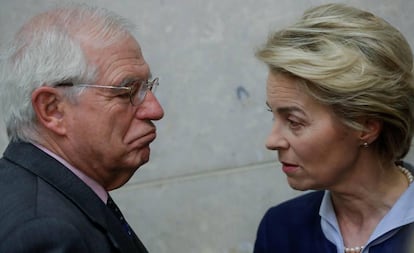In EU’s post-Brexit reshuffle, Spain drops out of race to replace Britain
Diplomatic sources say that the new coalition government prefers ad hoc alliances to joining the traditional French-German bloc

Spain is not willing to compete to replace Britain as one of the three driving forces of the European Union, together with France and Germany.
Instead of trying to fulfill the role of the United Kingdom, which officially left the EU on January 31 in a process known as Brexit, the government of Prime Minister Pedro Sánchez is opting for ad hoc alliances with different member states depending on the issue at hand and Spain’s own interests, said diplomatic sources.
“We could be with Germany or Italy on issues like immigration, and with France with matters such as a digital tax,” said sources familiar with the matter.
The new strategy represents a dramatic change to Spain’s former ambition of beating candidates such as Italy or Poland to join the traditional French-German bloc. While Britain’s departure from the EU has triggered a movement to reshape political alliances, Spain’s current administration is dropping out of the race to fill the void left by London.
We could be with Germany or Italy on issues like immigration, and with France with matters such as a digital taxUnnamed source
This diplomatic shift fits in well within the new EU, where a growing number of ad hoc alliances are being crafted by member states to deal with specific issues, as the old Franco-German axis starts to wane.
The new model also seems to meet the needs of Spain’s first coalition government since the democratic transition of the late 1970s. Formed by the pro-European Spanish Socialist Party (PSOE) and the Euro-skeptics of the leftist Unidas Podemos, the newly formed Spanish government will find it easier to accommodate its own differing views about the European project by refusing to adhere to any one specific bloc within the EU.
“The idea of a new directorate has become outdated,” said Spanish diplomatic sources just 48 hours after French President Emmanuel Macron’s visit to Poland, where he revived the idea that the so-called Weimar Triangle – a loose alliance between France, Germany and Poland – could take the reins of Europe following Britain’s departure.
Spain is clearly on the side of deeper political and economic ties
Germany, meanwhile, has close ties to the Netherlands, another country that longs for a key spot in the EU club. Italy, as the third-largest economy in the bloc, seemed like the natural candidate to fill Britain’s shoes, but its political instability, and above all the tremendous strength of the Euro-skeptics there (Matteo Salvini’s right-wing League won the European elections last year with 34.2% of the vote, although more recently it lost out to the left at the regional elections in Emilia-Romagna) work against it, given Germany’s and particularly Macron’s clearly pro-European views.
The question marks hanging over Italy had made Spain the most likely candidate to become the third member of the European leaders’ club. With a population of 46.6 million (eight million more than Poland), the bloc’s fourth largest economy is also one of the most enthusiastic about Europe’s political and economic integration.
But Spain’s Foreign Ministry does not consider seeking out this position a priority. “There is a debate about replacing Britain, as though it could actually be replaced,” said a diplomatic source ironically.
Britain has a population of 66 million and an economy twice the size of Spain’s and five times that of Poland. It also has nuclear weapons, a permanent seat on the United Nations Security Council, and is home to the biggest financial center in the euro zone.
No other triple alliance could beat the combined weight of Berlin, Paris and London. And in fact, both France and Germany have made it clear that Britain will continue to be a privileged partner in defense and foreign affairs, even after Brexit.
As the EU prepares for a two-year “Conference for the Future of Europe,” Spain is clearly on the side of deeper political and economic ties, even though it refuses to commit to backing France and Germany on all issues.
Diplomatic sources said that the Sánchez administration has been welcomed by the more pro-European member states, “since it could be an ally to push back against other tendencies that oppose integration.”
The first post-Brexit test of political alliances will be the new Multiannual Financial Framework for 2021-2027. Spain is planning to attend the February 20 summit as part of a loose grouping that’s been dubbed “Friends of Cohesion,” which includes Poland and Hungary, which are led by right-wing governments, as well as Portugal, which is governed by the left.
English version by Susana Urra.
Tu suscripción se está usando en otro dispositivo
¿Quieres añadir otro usuario a tu suscripción?
Si continúas leyendo en este dispositivo, no se podrá leer en el otro.
FlechaTu suscripción se está usando en otro dispositivo y solo puedes acceder a EL PAÍS desde un dispositivo a la vez.
Si quieres compartir tu cuenta, cambia tu suscripción a la modalidad Premium, así podrás añadir otro usuario. Cada uno accederá con su propia cuenta de email, lo que os permitirá personalizar vuestra experiencia en EL PAÍS.
¿Tienes una suscripción de empresa? Accede aquí para contratar más cuentas.
En el caso de no saber quién está usando tu cuenta, te recomendamos cambiar tu contraseña aquí.
Si decides continuar compartiendo tu cuenta, este mensaje se mostrará en tu dispositivo y en el de la otra persona que está usando tu cuenta de forma indefinida, afectando a tu experiencia de lectura. Puedes consultar aquí los términos y condiciones de la suscripción digital.








































